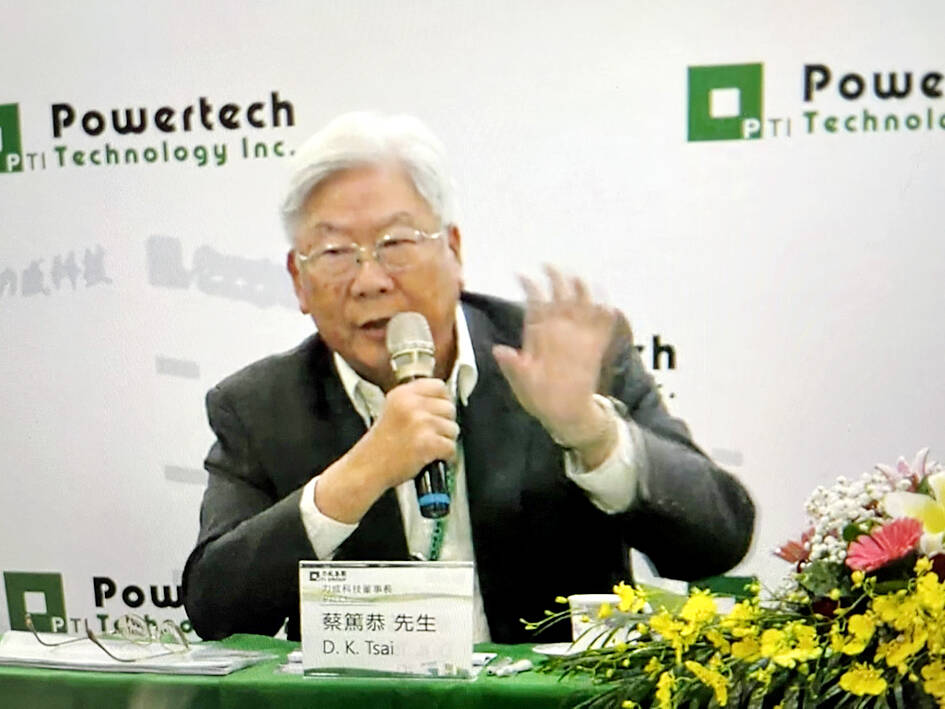Chip testing and packaging services provider Powertech Technology Inc (力成科技) yesterday said it expects a significant pickup in the second quarter of this year on recovering demand from the DRAM segment, after reporting its weakest earnings in six quarters last quarter.
The Hsinchu-based company said the first quarter would be the bottom of the current downcycle, with revenue expected to improve from the second quarter.
“The business pattern this year will be very different from what the company experienced last year, when the company reported strong results in the first half, but saw weakening performance in the second half due to the industry’s inventory correction,” Powertech chairman Tsai Du-kung (蔡篤恭) told an earnings conference.

Photo: Grace Hung, Taipei Times
Powertech expects to see a significant recovery next quarter mainly from its DRAM business as a major US customer has placed substantial orders, Powertech chief executive Boris Hsieh (謝永達) said.
DRAM demand would rise in the second half of the year with the introduction of new edge devices such as computers and smartphones equipped with artificial intelligence (AI) functions, which consume more DRAM and NAND flash memory chips, Hsieh said.
Hsieh expects revenue contribution from AI-related businesses to rise further this year. AI-related businesses made up 8 percent of the company’s total revenue last quarter, up from 4 percent in the first quarter of last year when the new business started contributing revenue.
To harness the strong growth opportunities from the AI boom, Powertech is deploying advanced chip packaging capacity, including chip-on-wafer, 2.5-dimensionIC, 3-dimensionIC packaging, and other products, the company said.
Powertech’s chip-on-wafer packaging service is targeting system companies, rather than foundry companies such as Taiwan Semiconductor Manufacturing Co (TSMC, 台積電), Tsai said.
TSMC has outsourced some chip-on-wafer orders to local chip packagers such as Siliconware Precision Industries Co (矽品精密) to mitigate capacity constraints.
The company plans to allocate NT$15 billion (US$457.8 million) for capital expenditure this year, up about 15 percent from NT$13 billion last year.
During the fourth quarter last year, the company’s net profit plummeted 55.7 percent year-on-year to NT$1.93 billion, supported by a disposal gain of NT$3.57 billion from selling one of its Chinese plants. On a sequential basis, net profit dipped 10.5 percent from NT$2.15 billion.
Last year as a whole, Powertech posted net profit of NT$8.5 billion, down 10.6 percent from NT$9.51 billion in 2023. Earnings per share fell to NT$9.09 from NT$10.72.
The company has proposed distributing a cash dividend of NT$7 per share, the same as last year, suggesting a payout ratio of 77 percent.

NEW IDENTITY: Known for its software, India has expanded into hardware, with its semiconductor industry growing from US$38bn in 2023 to US$45bn to US$50bn India on Saturday inaugurated its first semiconductor assembly and test facility, a milestone in the government’s push to reduce dependence on foreign chipmakers and stake a claim in a sector dominated by China. Indian Prime Minister Narendra Modi opened US firm Micron Technology Inc’s semiconductor assembly, test and packaging unit in his home state of Gujarat, hailing the “dawn of a new era” for India’s technology ambitions. “When young Indians look back in the future, they will see this decade as the turning point in our tech future,” Modi told the event, which was broadcast on his YouTube channel. The plant would convert

‘SEISMIC SHIFT’: The researcher forecast there would be about 1.1 billion mobile shipments this year, down from 1.26 billion the prior year and erasing years of gains The global smartphone market is expected to contract 12.9 percent this year due to the unprecedented memorychip shortage, marking “a crisis like no other,” researcher International Data Corp (IDC) said. The new forecast, a dramatic revision down from earlier estimates, gives the latest accounting of the ongoing memory crunch that is affecting every corner of the electronics industry. The demand for advanced memory to power artificial intelligence (AI) tasks has drained global supply until well into next year and jeopardizes the business model of many smartphone makers. IDC forecast about 1.1 billion mobile shipments this year, down from 1.26 billion the prior

People stand in a Pokemon store in Tokyo on Thursday. One of the world highest-grossing franchises is celebrated its 30th anniversary yesterday.

Zimbabwe’s ban on raw lithium exports is forcing Chinese miners to rethink their strategy, speeding up plans to process the metal locally instead of shipping it to China’s vast rechargeable battery industry. The country is Africa’s largest lithium producer and has one of the world’s largest reserves, according to the US Geological Survey (USGS). Zimbabwe already banned the export of lithium ore in 2022 and last year announced it would halt exports of lithium concentrates from January next year. However, on Wednesday it imposed the ban with immediate effect, leaving unclear what the lithium mining sector would do in the